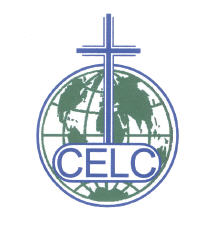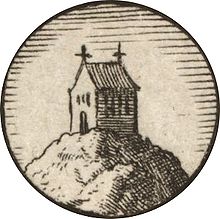
The Lutheran Church – Missouri Synod (LCMS), also known as the Missouri Synod, is a traditional, confessional Lutheran denomination in the United States. With 1.8 million members, it is the second-largest Lutheran body in the United States, behind the Evangelical Lutheran Church in America. The LCMS was organized in 1847 at a meeting in Chicago, Illinois, as the German Evangelical Lutheran Synod of Missouri, Ohio, and Other States, a name which partially reflected the geographic locations of the founding congregations.
The Evangelical Lutheran Church in America (ELCA) is a mainline Protestant Lutheran church headquartered in Chicago, Illinois. The ELCA was officially formed on January 1, 1988, by the merging of three Lutheran church bodies. As of 2022, it has approximately 2.9 million baptized members in 8,640 congregations.

The Wisconsin Evangelical Lutheran Synod (WELS), also referred to simply as the Wisconsin Synod, is an American Confessional Lutheran denomination of Christianity. Characterized as theologically conservative, it was founded in 1850 in Milwaukee, Wisconsin.

The Book of Concord (1580) or Concordia is the historic doctrinal standard of the Lutheran Church, consisting of ten credal documents recognized as authoritative in Lutheranism since the 16th century. They are also known as the symbolical books of the Evangelical Lutheran Church.

The Confessional Evangelical Lutheran Conference (CELC) is an international fellowship of 34 Confessional Lutheran church bodies.

The Evangelical Lutheran Synod (ELS) is a US-based Protestant Christian denomination based in Mankato, Minnesota. It describes itself as a conservative, Confessional Lutheran body. The ELS has 130 congregations and has missions in Peru, Chile, India, South Korea, Ukraine, Czech Republic, and Latvia.

The Evangelical Lutheran Synodical Conference of North America, often known simply as the Synodical Conference, was an association of Lutheran synods that professed a complete adherence to the Lutheran Confessions and doctrinal unity with each other. Founded in 1872, its membership fluctuated as various synods joined and left it. Due to doctrinal disagreements with the Lutheran Church–Missouri Synod (LCMS), the Evangelical Lutheran Synod (ELS) and the Wisconsin Evangelical Lutheran Synod (WELS) left the conference in 1963. It was dissolved in 1967 and the other remaining member, the Synod of Evangelical Lutheran Churches, merged into the LCMS in 1971.

The Evangelical Lutheran Free Church is a confessional Lutheran denomination based in Germany and Austria. It currently consists of 1,300 members in 17 congregations. The ELFK maintains a seminary for the training of pastors in the city of Leipzig.
The Lutheran Confessional Synod (LCS) was a Confessional Lutheran church, characterized by a strict interpretation of the Lutheran Confessions and a historical liturgy. Organized in 1994, when Christ Lutheran Church in Decatur, Illinois, broke away from the Evangelical Lutheran Church in America, it initially declared doctrinal agreement with the Wisconsin Evangelical Lutheran Synod and the Evangelical Lutheran Synod, but broke fellowship with those two synods on June 14, 1997, because of differences in the doctrine of the ministry and the Lord's Supper. The LCS organized the Johann Gerhard Institute and St. Anselm Theological Seminary in 1996.

The Independent Evangelical-Lutheran Church is a confessional Lutheran church body of Germany. It is a member of the European Lutheran Conference and of the International Lutheran Council (ILC). The SELK has about 33,000 members in 174 congregations. The seat of SELK is in Hanover.

The Lutheran Churches of the Reformation (LCR) is an association of Lutheran congregations. The LCR has its roots among groups of Lutherans that broke with the Lutheran Church–Missouri Synod (LCMS) in the middle of the 20th century, and was formally incorporated in 1964. Church services are generally traditional and reverent in the style of the mid-1900s conservative Christians.

The term Evangelical Catholic is used in Lutheranism, alongside the terms Augsburg Catholic or Augustana Catholic, with those calling themselves Evangelical Catholic Lutherans or Lutherans of Evangelical Catholic churchmanship stressing the catholicity of historic Lutheranism in liturgy, beliefs, practices, and doctrines. Evangelical Catholics teach that Lutheranism at its core "is deeply and fundamentally catholic". The majority of Evangelical Catholic Lutheran clergy and parishes are members of mainstream Lutheran denominations.
Lutheranism is a major branch of Protestantism, identifying primarily with the theology of Martin Luther, the 16th-century German monk and reformer whose efforts to reform the theology and practices of the Catholic Church launched the Protestant Reformation.

The North American Lutheran Church (NALC) is a Lutheran denomination with over 420 congregations in the United States, Canada, and Mexico, counting more than 142,000 baptized members. The NALC believes all doctrines should and must be judged by the teaching of the Christian Scriptures, in keeping with the historic Lutheran Confessions. It was established on August 27, 2010. The group describes itself as embodying the "theological center of Lutheranism in North America," noting that it stands between the more liberal Evangelical Lutheran Church in America (ELCA) and the more conservative Lutheran Church–Missouri Synod (LCMS) and other Lutheran church bodies in North America, "firmly within the global Lutheran mainstream".
The Spanish Evangelical Lutheran Church is a Confessional Lutheran church. It is in communion with other confessional Lutheran churches in the European Lutheran Conference (ELC) and globally in the International Lutheran Council (ILC). It adheres unreservedly to the historical confessions of the Lutheran Church: the Book of Concord of 1580, which they see as agreeing with Holy Scripture.

The General Lutheran Church, Inc. (GLC) is a small Lutheran denomination organized on March 9, 2014, and incorporated in the state of Indiana on October 26, 2017. The address of incorporation passed to Puerto Rico when the church changed leadership. It was founded when ministers of several Lutheran church bodies who objected to various positions held in their respective churches, specifically regarding atonement, women's ordination, worship styles, and the Lutheran Confessions, met to discuss these and other issues of concern. This meeting led to the establishment of the General Lutheran Church and to its endorsement of universal salvation, women's ordination, and flexibility with regards to liturgical matters. The church claims to be a successor to the former Evangelical Lutheran General Synod of the United States of America.
The Communion of Nordic Lutheran Dioceses are Lutheran dioceses that entered into schism with their nordic national churches in 2003 due to what they perceived as "the secularization of the national/state churches in their respective countries involving matters of both Christian doctrine and ethics". These dioceses are members of the International Lutheran Council, a body of Confessional Lutherans, they are in full communion with one another and include the Evangelical Lutheran Mission Diocese of Finland, Mission Province of the Church of Sweden, and the Evangelical Lutheran Diocese of Norway. These dioceses entered into schism with the Evangelical Lutheran Church of Finland, Church of Sweden, and Church of Norway, respectively, though the Mission Province considers itself to be a non-territorial diocese within the Church of Sweden. Their lines of apostolic succession derive from other traditional Lutheran Churches, such as the Evangelical Lutheran Church in Kenya; Walter Obare Omwanza, presiding bishop of the Evangelical Lutheran Church in Kenya, assisted by bishops Leonid Zviki from Belarus, David Tswaedi from South Africa, Børre Knudsen and Ulf Asp from Norway, consecrated Arne Olsson in apostolic succession as the Ordinary for the Mission Province. The first bishop of the Evangelical Lutheran Mission Diocese of Finland, Risto Soramies, was then ordained by Matti Väisänen of the Mission Province of the Church of Sweden. These dioceses have an Evangelical Catholic churchmanship, reflective of the influence of High Church Lutheranism and Pietist Lutheranism in Scandinavia. As such, the Communion of Nordic Lutheran Dioceses affirms:
We believe, teach and confess that biblical faith and doctrine which is founded on the prophetic and apostolic Scriptures of the New and the Old Testament and which has been expressed in the three main creeds of the Early Church, that is, the Apostolic, the Nicene-Constantinopolitan and the Athanasian Creed, and in the unaltered Augsburg Confession, and that is rightly and bindingly explained by all the books accepted into the Book of Concord of the Lutheran Church.
In confessional churches, office-bearers are required to "subscribe" to the church's confession of faith. In Presbyterian denominations, this is the Westminster Confession of Faith, while in Confessional Lutheranism it is the Book of Concord. The degree to which subscribers are required to agree with the confession varies from denomination to denomination.










